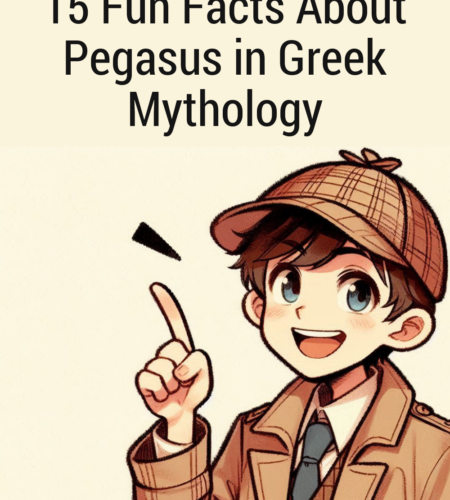Greek mythology is filled with fascinating creatures and characters, and one of the most enchanting is Pegasus. A winged horse of divine origin, Pegasus has captured the imagination of generations with its unique blend of grace and power. In this article, we’re going to dive into the world of Greek mythology and explore 15 intriguing facts about Pegasus. From its birth to its heroic adventures, Pegasus is a creature like no other, and these facts will shed light on the mystical beauty of this legendary creature.
Fact 1: The Divine Birth of Pegasus
- Born of the Gorgon’s Blood: Pegasus’s unique origin story begins with the Gorgon Medusa. When Perseus beheaded Medusa, the blood that spurted from her neck gave birth to the winged horse, Pegasus. This divine birth sets the stage for many of Pegasus’s mythological adventures.
- Sibling Rivalry: Pegasus had a brother, Chrysaor, who emerged from the blood at the same time. While Pegasus became a symbol of grace and freedom, Chrysaor was known for his fierce and warrior-like nature.
- The Serpent Slayer: Pegasus is often depicted as a dragon or serpent slayer. It was believed to have the power to vanquish these mythical creatures, a testament to its divine lineage.
Fact 2: The Magnificent Wings of Pegasus
- Feathers of Gold: Pegasus’s wings are often described as having feathers of gold. These radiant wings allowed the horse to soar through the skies with ease and grace, making it a symbol of freedom and beauty.
- The Winged Steed of Heroes: In Greek mythology, Pegasus was often used as a symbol of hope and courage. It was the chosen steed of many legendary heroes, including Bellerophon and Perseus.
- Constellation Connection: Pegasus is not only a figure in mythology but also a constellation in the night sky. Look up, and you might spot the winged horse among the stars.
Fact 3: Bellerophon and Pegasus
- The Taming of Pegasus: Bellerophon, a mortal hero, tamed Pegasus with the help of Athena and Poseidon. He used a golden bridle gifted by the gods to control the winged horse.
- The Defeat of the Chimaera: Bellerophon, riding Pegasus, defeated the fearsome Chimaera, a fire-breathing monster with a lion’s head, a goat’s body, and a serpent’s tail. This heroic act made Pegasus famous for its role in the battle.
- The Icarus Connection: Pegasus is sometimes confused with another famous figure from Greek mythology, Icarus, who flew too close to the sun with wings made of feathers and wax. However, Pegasus’s wings were divine and did not suffer the same fate.
Fact 4: Pegasus as a Symbol of Inspiration
- The Fountain of the Muses: Pegasus played a significant role in Greek culture as a symbol of inspiration. It was believed that the winged horse created the Hippocrene, a spring that was the source of inspiration for the Muses, the goddesses of the arts.
- Literary Inspiration: Throughout history, Pegasus has been a symbol of poetic inspiration. Its image appears on various pieces of literature, from ancient Greek poetry to modern novels and poems.
- A Winged Metaphor: In contemporary language, the term “Pegasus” is used to describe any creative or groundbreaking endeavor. When someone talks about achieving the “Pegasus of the industry,” they mean reaching new heights of success.
Fact 5: Pegasus in Art and Culture
- A Frequent Subject of Art: Pegasus has been a popular subject in art throughout the ages. Paintings, sculptures, and mosaics often depict the magnificent winged horse.
- In Pop Culture: Pegasus has made appearances in various forms of pop culture, from animated films like Disney’s “Hercules” to video games, where players can ride Pegasus on epic adventures.
- Sculptures and Statues: You can find numerous statues and sculptures of Pegasus in cities worldwide, where it serves as a symbol of grace and freedom.
Fact 6: Pegasus and the Muses
- Muse Connection: Pegasus’s connection to the Muses goes beyond inspiration. The Muses themselves were sometimes depicted riding on the back of Pegasus, further emphasizing its role as a source of creativity.
- Poetry and Music: Pegasus has often been associated with poetry and music. It’s believed that anyone who drinks from the Hippocrene spring would gain extraordinary talent in these artistic pursuits.
- Winged Songstress: In some myths, Pegasus was a songstress, using its melodious voice to captivate those who heard it. Its songs were said to be so beautiful that they could move even the most stoic of hearts.
Fact 7: Pegasus in Modern Symbolism
- A Symbol of Freedom: In the modern world, Pegasus continues to symbolize freedom and the pursuit of dreams. It’s an emblem for many organizations and companies that want to convey a sense of liberty and ambition.
- Pegasus Airlines: Pegasus Airlines, a well-known Turkish airline, features Pegasus prominently in its logo. The airline aims to make air travel accessible to all, reflecting Pegasus’s spirit of inclusivity.
- The Role in Corporate World: Pegasus has become a symbol of corporate excellence. Companies often associate themselves with Pegasus to represent their ability to rise above challenges and achieve success.
Fact 8: Pegasus in Different Mythologies
- Beyond Greece: While Pegasus is most famous in Greek mythology, it appears in various forms in other cultures. In Arabic mythology, for instance, it’s known as Buraq and is believed to have transported the Prophet Muhammad.
- Cross-Cultural Influence: The image of a winged horse, similar to Pegasus, can be found in diverse mythologies, showcasing how this captivating creature transcends cultural boundaries.
- Mythological Crossovers: Some modern fantasy literature and movies have taken inspiration from Pegasus and integrated it into other mythological or fictional universes.
Fact 9: Pegasus in Renaissance Art
- Prolific Renaissance Symbol: During the Renaissance period, Pegasus was a prominent symbol in art and literature. It was often used to represent poetic inspiration, especially by the Italian poets of the time.
- Connection to the Medici Family: The Medici family, one of the most influential families in Renaissance Florence, adopted Pegasus as their emblem, emphasizing their appreciation for art and culture.
- Pegasus and Botticelli: The famous painter Sandro Botticelli featured Pegasus in his masterpieces, including “The Birth of Venus,” where Pegasus can be seen in a shell-shaped chariot.
Fact 10: Pegasus in Space Exploration
- NASA’s Pegasus: NASA has a rocket system known as Pegasus, which is used to launch small payloads into space. The name was chosen to symbolize the rocket’s agility and ability to carry payloads to new heights.
- Interstellar Exploration: Pegasus is a fitting symbol for space exploration, as it embodies the idea of transcending earthly boundaries and venturing into the unknown.
- Scientific Progress: The connection between Pegasus and space exploration underscores humanity’s quest for scientific progress and discovery.
Fact 11: The Tragic End of Pegasus
- The Death of Pegasus: In some versions of Greek mythology, Pegasus meets a tragic end. After helping Bellerophon in his heroic endeavors, Pegasus was struck by a thunderbolt from Zeus and sent to the stars, where it became the constellation.
- A Bittersweet Conclusion: Pegasus’s death is a bittersweet ending to its mythological journey. It achieved fame and honor but had to give up its earthly existence in the process.
- Immortal Legacy: While Pegasus may have left the mortal world, it continues to inspire and captivate our imaginations to this day.
Fact 12: Pegasus in Astrology
- Pisces Connection: In astrology, Pegasus is associated with the sign of Pisces. People born under the Pisces sign are often seen as imaginative, creative, and emotionally attuned—qualities that align with Pegasus’s mythological attributes.
- Imagination and Intuition: Pegasus’s connection to Pisces highlights the importance of imagination and intuition in the lives of those born under this sign.
- Embracing the Mythical: For many Pisces individuals, the mystical and the mythical hold a special place in their hearts, just as Pegasus does in the world of mythology.
Fact 13: Pegasus in Children’s Literature
- Timeless Appeal: Pegasus remains a beloved character in children’s literature. It has appeared in countless stories and picture books, captivating the hearts and minds of young readers.
- Lessons of Imagination: Pegasus stories often impart important life lessons about bravery, friendship, and the power of imagination.
- A Source of Wonder: Pegasus continues to spark the curiosity and wonder of young readers, introducing them to the magic of Greek mythology.
Fact 14: Pegasus and the Power of Dreams
- Dream Interpretation: In dream interpretation, Pegasus is seen as a symbol of aspiration and the pursuit of one’s dreams. Dreaming of Pegasus may signify a desire for personal growth and achieving lofty goals.
- The Symbolism of Flight: Pegasus’s ability to fly represents the desire to rise above life’s challenges and reach for the sky.
- Empowerment Through Dreams: Pegasus serves as a reminder that our dreams have the potential to empower us and lead us to new horizons.
Fact 15: Pegasus in Contemporary Art and Literature
- A Timeless Muse: Pegasus continues to inspire contemporary artists and authors. Its enduring legacy in modern creative works highlights its timeless appeal.
- Literary Resurgence: Pegasus is a recurring theme in modern literature, where authors reimagine its character in new and exciting ways, keeping the myth alive for future generations.
- A Symbol of Endurance: Pegasus embodies the enduring power of stories and how they can evolve and adapt to capture the imagination of each generation.
Conclusion
Pegasus, the winged horse of Greek mythology, represents an enduring symbol of inspiration, creativity, and freedom. Its divine birth, role in heroic adventures, and influence on art, culture, and even space exploration showcase its profound impact on human imagination. Whether you look to the night sky, read a children’s book, or embark on a creative endeavor, Pegasus’s legacy continues to inspire and uplift us, reminding us of the power of dreams and the magic of mythology.
Subscribe to our email newsletter to get the latest posts delivered right to your email.





Comments